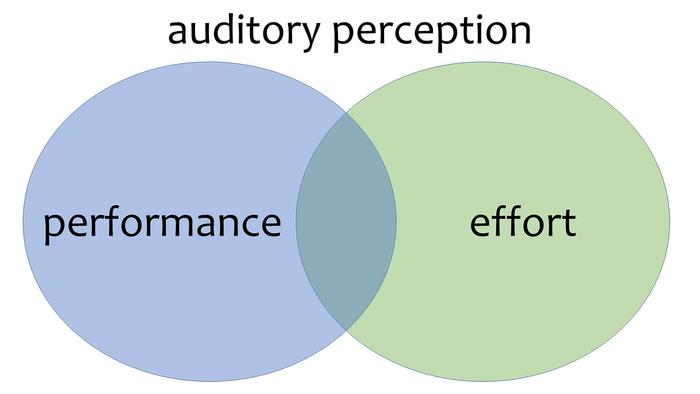DENVER, May 24, 2022 – Degraded acoustic signals can make hearing difficult for anyone, but differences in cognitive abilities, age-related changes, and the use of cochlear implants may exacerbate the problem. If it is more challenging to hear, it is also exhausting to communicate.

Credit: Kristina DeRoy Milvae
DENVER, May 24, 2022 – Degraded acoustic signals can make hearing difficult for anyone, but differences in cognitive abilities, age-related changes, and the use of cochlear implants may exacerbate the problem. If it is more challenging to hear, it is also exhausting to communicate.
In her presentation, “Aging effects on listening effort in cochlear-implant users,” Kristina DeRoy Milvae will discuss the results of two experiments that examined impacts on listening effort. The session will take place May 24 at 12:50 p.m. Eastern U.S. at the 182nd Meeting of the Acoustical Society of America at the Sheraton Denver Downtown Hotel.
The first experiment measured how changes in acoustic signal degradation affected listening effort in younger and older adults with normal hearing. Pupil dilation was used as a proxy for listening effort. As people age, highly degraded signals can result in listeners needing to exert even more effort.
In the second experiment, Milvae and her team tested how individual differences in working memory scores affected listening effort in cochlear implant users. Lower working memory scores did not predict increased listening effort.
“A better understanding of listening effort gives a more holistic picture of how we hear,” said Milvae. “Measures of listening effort can help us to better understand the cochlear implant listening experience and help the scientific community to work toward evidence-based approaches to improve listening effort in populations with hearing loss.”
The team’s results emphasize the importance of developing practices to reduce listening effort. Milvae sees three potential paths forward: technological advances in cochlear implants to improve signal clarity, secondary cochlear implants for some users, and aural rehabilitation measures.
“With a cochlear implant, one may be able to better communicate in a noisy restaurant than without. It may take some effort, but with that effort comes the social interaction that was not possible before,” she said. “What is clinically important is to help those who are constantly in a state of high listening effort, which could lead to fatigue and reduced quality of life, because they will want to avoid these social situations.”
———————– MORE MEETING INFORMATION ———————–
USEFUL LINKS
Main meeting website: https://acousticalsociety.org/asa-meetings/
Technical program: https://eventpilotadmin.com/web/planner.php?id=ASASPRING22
Press Room: https://acoustics.org/world-wide-press-room/
WORLDWIDE PRESS ROOM
In the coming weeks, ASA’s Worldwide Press Room will be updated with additional tips on dozens of newsworthy stories and with lay language papers, which are 300 to 500 word summaries of presentations written by scientists for a general audience and accompanied by photos, audio and video. You can visit the site during the meeting at http://acoustics.org/world-wide-press-room/.
PRESS REGISTRATION
We will grant free registration to credentialed journalists and professional freelance journalists. If you are a reporter and would like to attend, contact AIP Media Services at [email protected]. For urgent requests, staff at [email protected] can also help with setting up interviews and obtaining images, sound clips, or background information.
ABOUT THE ACOUSTICAL SOCIETY OF AMERICA
The Acoustical Society of America (ASA) is the premier international scientific society in acoustics devoted to the science and technology of sound. Its 7,000 members worldwide represent a broad spectrum of the study of acoustics. ASA publications include The Journal of the Acoustical Society of America (the world’s leading journal on acoustics), JASA Express Letters, Proceedings of Meetings on Acoustics, Acoustics Today magazine, books, and standards.




